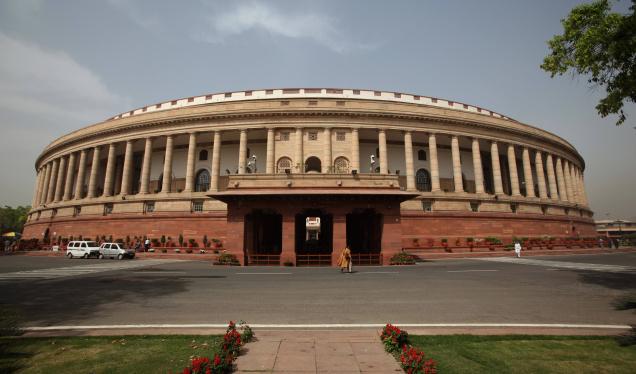In three Parliament sessions of 2016, the government failed to pass important bills like Surrogacy (Regulation) bill, Maternity Benefit (Amendment) bill and Transgender bill. With regular disruptions, the people’s representatives once again failed to carry out their duty. In some good news, the GST Bill was passed amid uproar and notified in The Gazette of India.
Here are the details of bills which have not been passed:
The Taxation Laws (Second Amendment) Bill
The bill was introduced in Lok Sabha on Nov 28. It seeks to amend the Income Tax Act, 1961 and Finance Act, 2016.
The National Institutes of Technology Science Education and Research (Second Amendment) Bill
The bill was introduced in LS by the Minister of Human Resource Development, Prakash Javadekar, on July 19. The Bill seeks to establish the National Institute of Technology (NIT), Andhra Pradesh as an institute of national importance under the National Institutes of Technology, Science Education and Research (NITSER) Act, 2007.
Science Education and Research (Second Amendment) Bill
The bill was introduced by the Minister of Human Resource Development, Prakash Javadekar in Lok Sabha on December 9. The Bill amends the National Institutes of Technology, Science Education and Research Act, 2007 (NITSER Act). The NITSER Act declares certain institutions of technology, science education and research as Institutes of National Importance and provides for research, training and dissemination of knowledge in these institutions.
The Payment of Wages (Amendment) Bill
The bill was introduced in Lok Sabha on December 15 by the Minister of Labour and Employment, Bandaru Dattatreya. The Bill amends the Payment of Wages Act, 1936. Under the 1936 Act, all wages must be paid either in coin or currency notes, or both. However, the employer may pay his employee’s wages either by cheque or by crediting it into his bank account, after obtaining his written authorisation.
The Merchant Shipping Bill
The bill was introduced in Lok Sabha on August 10, 2015 by the Minister of Shipping, Nitin Gadkari. The Bill amends the Merchant Shipping Act, 1958 to ensure compliance with the International Convention on Civil Liability for Bunker Oil Pollution Damage 2001. The Convention ensures that adequate, prompt, and effective compensation is available to persons who suffer damage caused by oil spills, when carried as fuel in ships’ bunkers.
The Surrogacy (Regulation) Bill
The bill was introduced by Minister of Health and Family Welfare, JP Nadda in Lok Sabha on Nov21. The Bill defines surrogacy as a practice where a woman gives birth to a child for an intending couple and agrees to hand over the child after the birth to the intending couple.
The Admiralty (Jurisdiction and Settlement of Maritime Claims) Bill
The Bill was introduced in Lok Sabha on Nov 21 by the Minister of State for Shipping, Mansukh Mandaviya. The Bill seeks to consolidate the existing laws on civil matters of admiralty jurisdiction of courts, admiralty proceedings on maritime claims, and arrest of ships. Admiralty laws deal with cases of accidents in navigable waters or involve contracts related to commerce on such waters. The Bill repeals laws such as the Admiralty Court Act, 1861, the Colonial Courts of Admiralty Act, 1890.
The Citizenship (Amendment) Bill
The Bill amends the Citizenship Act, 1955 to make illegal migrants who are Hindus, Sikhs, Buddhists, Jains, Parsis and Christians from Afghanistan, Bangladesh and Pakistan, eligible for citizenship. Under the Act, one of the requirements for citizenship by naturalisation is that the applicant must have resided in India during the last 12 months, and for 11 of the previous 14 years. The Bill relaxes this 11 year requirement to six years for persons belonging to the same six religions and three countries.
The High Courts (Alteration of Names) Bill
The High Courts (Alteration of Names) Bill, 2016 was introduced in Lok Sabha on July 19 by the Minister of Law and Justice, Ravi Shanker Prasad. The Bill seeks to modify the names of the High Courts (HCs) of Bombay, Calcutta and Madras. Alteration of names of the HCs: The High Courts of Bombay, Calcutta and Madras will be known as the High Courts of Mumbai, Kolkata and Chennai respectively.
The Transgender Persons (Protection of Rights) Bill
The Bill defines a transgender person as one who is partly female or male; or a combination of female and male; or neither female nor male. In addition, the person’s gender must not match the gender assigned at birth, and includes trans-men, trans-women, persons with intersex variations and gender-queers.
The Employee’s Compensation (Amendment) Bill
The Employee’s Compensation (Amendment) Bill, 2016 was introduced in Lok Sabha on August 5by the Minister for Labour and Employment, Bandaru Dattatreya.
The Bill amends the Employee’s Compensation Act, 1923. The Act provides payment of compensation to employees and their dependants in the case of injury by industrial accidents, including occupational diseases.
The Motor Vehicles (Amendment) Bill
The Motor Vehicles (Amendment) Bill, 2016 was introduced in Lok Sabha on August 9 by the Minister of Road Transport and Highways, Nitin Gadkari. The Bill seeks to amend the Motor Vehicles Act, 1988. The Act provides for standards for motor vehicles, grant of driving licenses, and penalties for violation of these provisions.
The Factories (Amendment) Bill, 2016
The Factories (Amendment) Bill, 2016 was introduced in Lok Sabha on August 10 by the Minister for Labour and Employment, Bandaru Dattatreya. The Bill amends the Factories Act, 1948. The Act regulates the safety, health and welfare of factory workers. The Bill amends provisions related to overtime hours of work.
Maternity Benefit (Amendment) Bill
The Act provides maternity leave up to 12 weeks for all women. The Bill extends this period to 26 weeks. However, a woman with two or more children will be entitled to 12 weeks of maternity leave. The Bill introduces maternity leave up to 12 weeks for a woman who adopts a child below the age of three months, and for commissioning mothers. The period of maternity leave will be calculated from the date the child is handed over to the adoptive or commissioning mother.
The Enemy Property (Amendment and Validation) Bill
The Bill amends the Enemy Property Act, 1968, to vest all rights, titles and interests over enemy property in the Custodian. The Bill declares transfer of enemy property by the enemy, conducted under the Act, to be void. This applies retrospectively to transfers that have occurred before or after 1968. The Bill prohibits civil courts and other authorities from entertaining disputes related to enemy property.
The Companies (Amendment) Bill
The Bill amends the Companies Act, 2013 in relation to structuring, disclosure and compliance requirements for companies. The Act limits the number of intermediary companies through which investments can be made in a company. Similarly, the Act limits the number of layers of subsidiaries a company can have. The Bill removes these limits.
Here are bills which have been passed in 2016
The amendments to the Goods and Services Tax bill was cleared by the Rajya Sabha unanimously in both houses. The bill was introduced in the Lok Sabha by Finance Minister Arun Jaitley on 19 December 2014, and passed by the House on 6 May 2015. In the Rajya Sabha, the bill was referred to a Select Committee on 14 May 2015. The Select Committee of the Rajya Sabha submitted its report on the bill on 22 July 2015. The bill was passed by the Rajya Sabha on 3 August 2016, and the amended bill was passed by the Lok Sabha on 8 August 2016. The bill, after ratification by the states, received assent from President Pranab Mukherjee on 8 September 2016, and was notified in The Gazette of India on the same date.
Other bills which passed in 2016 are:
The Rights of Persons with Disabilities Bill
The Institutes of Technology (Amendment) Bill
The Lokpal and Lokayuktas (Amendment) Bill
The Central Agricultural University (Amendment) Bill
The Enforcement of Security Interest and Recovery of Debts Laws and Miscellaneous Provisions (Amendment) Bill
The Constitution (Scheduled Castes) Order (Amendment) Bill
The Regional Centre for Biotechnology Bill
The Mines and Minerals (Development and Regulation) Amendment Bill
The Sikh Gurdwaras (Amendment) Bill
The Election Laws (Amendment) Bill
The Aadhaar (Targeted Delivery of Financial and Other Subsidies, Benefits and Services) Bill,
The Bureau of Indian Standards Bill
The Carriage by Air (Amendment) Bill
The High Court and the Supreme Court Judges (Salaries and Conditions of Service) Amendment Bill,
The National Waterways Bill
The Real Estate (Regulation and Development) Bill

















